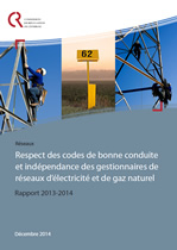
Jan. 8, 2015
Breaking news

The French law provides that the Commission de Régulation de l'Énergie - CRE (French Regulatory Energy Commission) publishes an annual report on compliance with codes of conduct and independence of the power transmission grid operators. In Decembre 2014, CRE has published its report on compliance with codes of conduct and independence of electricity networks and natural gas (Respect des codes de bonne conduite et indépendance des gestionnaires de réseaux d'électricité et de gaz naturel).
This particular statutory provision shows the proximity between Regulation and Governance, nearby sometimes believed limited to the sphere of banking and finance.
This is designed especially for managers of transport networks which are often subsidiaries of incumbents production and energy sales, economic and legal integration that the law does not prohibit even though it requires independence transport network managers. This independence must be de facto and not de jure, which is a higher requirement than mere legal autonomy of companies, the result of the requirements of "governance", the operator is obliged not to exercise the rights and powers its parent company status yet gives a regular basis so that the first principle of independence of the network manager is preserved.
The relationship between the controlling shareholder and its subsidiary are governed by "codes of conduct" in the mandatory order of the independence of management and decision making of the subsidiary. In a 90-page reportthe regulator sets the constraints so that this goal leads in effect on the parent company, beyond corporate law.
However, the regulator is very severe. It believes that the way in which subsidiaries present themselves to consumers mark such similarity with their parent that these third parties can't identify them as independent of them. According to the regulator, consumers therefore don't identify them as carriers or distributors of energy also offered by competitors of their parent.
Thus, the regulator considers it necessary that these subsidiaries will change their brands, logos and legal designation, eg ERDF ceases to have a name so close to EDF.
The implicit question is the legal effect of such reproaches and suggestions, if the companies aren't listening. The report discusses the prospect to bring the question before their independent body able to impose sanctions. But the case will be difficult because the principle of independence meets the principle of freedom and the terms of the interference between regulatory law and corporate law aren't yet clearly established.
Oct. 15, 2014
Thesaurus : Doctrine
Complete reference: GERMAIN, Michel and MAGNIER, Véronique, Traité de droit des affaires - Les sociétés commerciales (Law Treaty - Commercial companies), 21th ed., LGDJ - Lextenso éditions, Paris, 1054 p.
This book is written in French.
On listed companies, see p. 799-1034.
Read paperback.
Read the table of contents.
Dec. 1, 2006
Thesaurus : Doctrine
Complete reference : Trébulle, F.-G., Stakeholders Theory et droit des sociétés, Bull. Joly Sociétés, 1st Dec. 2006, p.1337 . ; 1st Jan. 2007, p.1 et s.
June 16, 2004
Thesaurus : Doctrine
